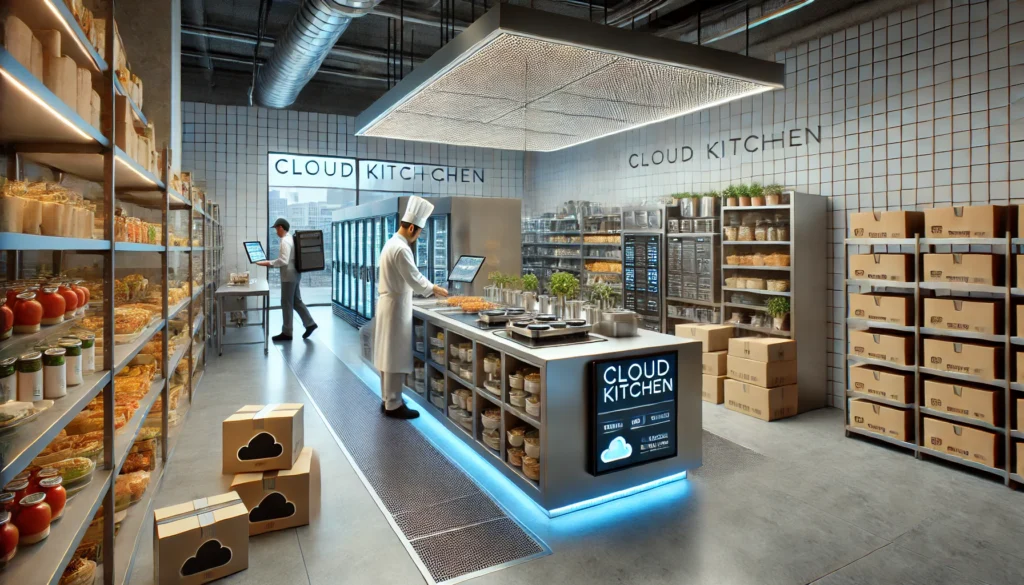Introduction: Why Start a Cloud Kitchen in Dubai?
Dubai has rapidly emerged as a hub for food delivery services, driven by its diverse population and high demand for convenience. Setting up a cloud kitchen in Dubai presents an opportunity to tap into this growing market. With lower operational costs compared to traditional restaurants and the ability to experiment with multiple cuisines, cloud kitchens have revolutionized the food industry.
Moreover, Dubai’s strategic location and advanced logistics infrastructure make it an ideal place for a delivery-based business. The city’s digital transformation, including widespread use of delivery apps, further supports the success of cloud kitchens.
Key Steps for Starting a Cloud Kitchen in Dubai

1. Obtain the Necessary Licenses for Cloud Kitchen
Operating a cloud kitchen requires compliance with local regulations to ensure food safety and legal operation. Here are the two main licenses needed:
Food Safety Permit
This ensures that your kitchen adheres to Dubai Municipality’s health and safety standards. Regular inspections will be conducted to maintain compliance.
Trade License of a Cloud Kitchen
Issued by the Department of Economic Development (DED), this license legally allows you to operate your business within Dubai.
Without these licenses, your operations could face hefty fines or shutdowns. Visit Dubai Municipality – Food Safety for detailed guidelines on food safety.
To setup your Cloud Kitchen License you can read our article about company formation “Business Setup in Dubai The Ultimate Guide to 2024 – Part 1”
2. Choose the Right Location for your Cloud Kitchen
Location is crucial, even for cloud kitchens. While there’s no need for a storefront, proximity to your target audience and delivery zones significantly impacts delivery times and customer satisfaction.
Options to consider
Industrial Kitchens
High-capacity kitchens located in strategic industrial areas. These spaces are designed for bulk food preparation and distribution.
Shared Kitchen Spaces
Also known as commissary kitchens, these allow startups to rent a portion of a fully equipped kitchen, reducing initial costs.
Selecting the right location can help streamline logistics and improve your delivery efficiency.
3. Equip Your Cloud Kitchen
Investing in high-quality kitchen equipment is essential to ensure smooth operations. Key equipment includes:
Cooking Appliances
Ovens, grills, and stovetops suited to your menu.
Cold Storage
Refrigerators and freezers to store ingredients and maintain food freshness.
Packaging Tools
Machines for sealing and labeling to ensure food safety during delivery.
The choice of equipment should align with your menu requirements and expected order volumes.
4. Develop a Strong Brand
Branding is critical in the competitive food delivery market. With no physical storefront, your online presence and packaging will be the primary touchpoints for customers.
Key steps to build a strong brand
Design a Unique Logo and Visual Identity
This helps customers recognize and remember your brand.
Create an Engaging Website
Showcase your menu, story, and customer testimonials. Include a user-friendly ordering system.
Social Media Marketing
Platforms like Instagram and TikTok are powerful tools to promote your offerings and engage with your audience.
5. Implement Efficient Delivery Systems
Delivery is at the heart of a cloud kitchen’s operations. To ensure timely and efficient service, consider these strategies:
Partner with Delivery Platforms
Collaborate with popular services like Deliveroo, Talabat, and Zomato. They offer a broad customer base and streamlined logistics.
In-House Delivery
If you want more control over the delivery process, hire your own delivery personnel. This can enhance customer experience through faster and more reliable service.
Using GPS tracking systems can also improve route optimization and delivery times.
6. Focus on Marketing and Customer Retention
A strong marketing strategy is essential to attract new customers and keep existing ones engaged.
Effective marketing tactics include
Social Media Campaigns
Use targeted ads and organic content to reach your audience. Highlight special offers and new menu items.
Loyalty Programs
Offer points or discounts for repeat customers.
Collaborations and Promotions
Partner with local influencers or run limited-time promotions to boost visibility
What Makes Dubai the Perfect Spot for a Cloud Kitchen Business?

Dubai’s unique market dynamics make it a prime location for cloud kitchen. The city’s cosmopolitan population creates a demand for diverse cuisines, while its digital ecosystem supports seamless food delivery.
5 Must-Have Tools for Your Cloud Kitchen Setup
- Commercial ovens and stoves.
- High-capacity refrigerators and freezers.
- Packaging and sealing machines.
- Order management software.
- Delivery tracking systems.
Additional Considerations
Compliance with Health and Safety Regulations
Regular inspections by Dubai Municipality ensure that food preparation areas meet hygiene standards. Maintaining cleanliness and proper storage of ingredients is non-negotiable.
Technology Integration
Invest in order management systems and delivery tracking software to streamline operations. Many cloud kitchens also use data analytics to monitor customer preferences and optimize their menus.
Scalability and Menu Experimentation
One of the advantages of cloud kitchens is the ability to quickly scale or pivot. You can introduce new menu items or launch virtual brands without significant additional costs.
Conclusion
Starting a cloud kitchen in Dubai offers a modern and flexible approach to entering the food industry. By following these steps—from securing licenses and choosing the right location to developing a strong brand and marketing strategy—you can set your business up for success.
Dubai’s thriving market and supportive infrastructure provide a fertile ground for cloud kitchens to flourish. Take the first step today and bring your culinary vision to life!


